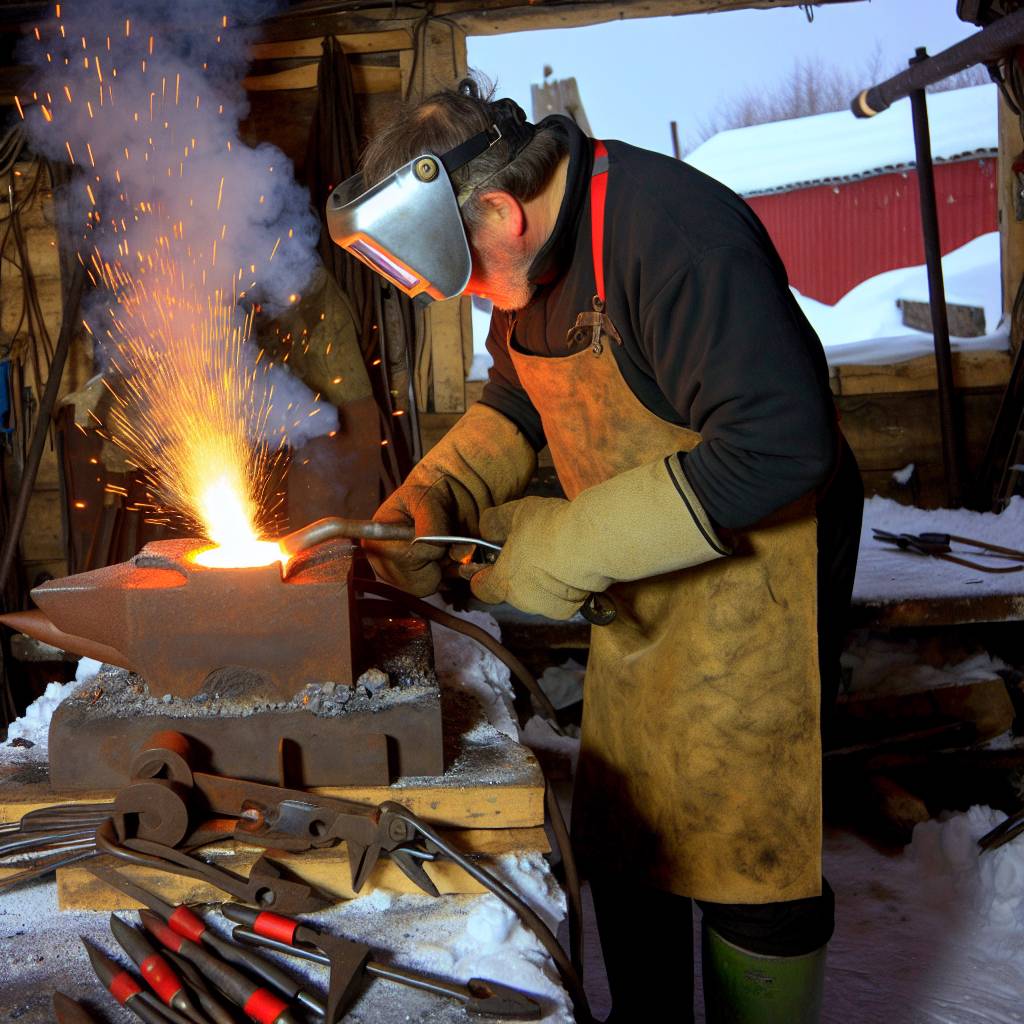Overview of Metal Fabrication Industry in Canada
The metal fabrication industry is vital to Canada’s economy.
This industry encompasses various processes such as cutting, bending, and assembling metal structures.
It provides essential materials for construction, automotive, and aerospace sectors.
Moreover, it includes both large-scale manufacturers and small businesses.
Current Industry Landscape
The Canadian metal fabrication industry is experiencing steady growth.
Technological advancements are reshaping production methods.
Additionally, automation plays a significant role in enhancing efficiency.
Consequently, companies are finding innovative ways to meet market demand.
The skilled labor force is a cornerstone of this growth.
Key Players and Market Demand
Numerous companies drive the metal fabrication market in Canada.
Industries like automotive and construction are major consumers.
They rely heavily on high-quality metal components.
Some companies, like Maple Leaf Fabrication, lead in custom metal solutions.
Furthermore, evolving consumer preferences create opportunities for innovation.
Future Trends and Opportunities
The future of metal fabrication appears promising in Canada.
Increased focus on sustainability influences industry practices.
Additionally, the integration of smart manufacturing processes is on the rise.
These advancements create more efficient production environments.
As a result, new roles and career pathways emerge within the industry.
Challenges Facing the Industry
Despite its growth, the industry faces several challenges.
Labor shortages remain a pressing issue for many companies.
Competition from international markets impacts local businesses.
Moreover, navigating regulatory requirements can be complex.
To thrive, companies must adopt strategic approaches to overcome these hurdles.
Essential Skills and Qualifications for Metal Fabricators
Technical Skills
Metal fabricators need strong technical skills for success.
Unlock Your Career Potential
Visualize a clear path to success with our tailored Career Consulting service. Personalized insights in just 1-3 days.
Get StartedUnderstanding blueprint reading is vital for accurate assembly.
Familiarity with welding techniques ensures quality work.
Additionally, proficiency in operating machinery is essential.
Competence in measuring and cutting materials accurately is crucial.
Soft Skills
Metal fabricators benefit from excellent problem-solving abilities.
Critical thinking enables them to address challenges quickly.
Strong communication skills improve teamwork and project coordination.
Furthermore, attention to detail ensures high-quality finishes.
Education and Training
A high school diploma is typically the minimum requirement.
Many metal fabricators complete vocational training programs.
Apprenticeships provide essential hands-on experience in the field.
Continuing education keeps them updated on industry advancements.
Certification
Obtaining certification can enhance job prospects for fabricators.
The Canadian Welding Bureau offers recognized certification programs.
Certifications demonstrate a commitment to quality and safety standards.
Employers often prefer certified candidates for critical roles.
Industry Knowledge
Familiarity with specific industry standards is essential for fabricators.
Understanding compliance regulations protects the integrity of projects.
Knowledge of different materials broadens their versatility in work.
Moreover, staying informed about new technologies can boost efficiency.
Job Outlook and Demand for Metal Fabricators in Canada
Current Industry Landscape
The demand for metal fabricators in Canada continues to grow.
Industries such as construction and manufacturing rely heavily on metal fabrication.
According to recent reports, the construction industry is forecasted to expand significantly.
This trend positively impacts the need for skilled metal fabricators.
Employment Opportunities
Metal fabricators can find numerous job opportunities across Canada.
Regions such as Ontario and Alberta lead in job availability.
Companies are increasingly looking for skilled workers to fill these roles.
Additionally, many employers offer competitive salaries and benefits.
Increasing Skills Demand
With new technologies emerging, the skills required for metal fabrication are changing.
Workers must stay updated with advancements in welding and metalworking technology.
Employers often seek candidates who have certifications and training.
As a result, continuing education plays an essential role in career growth.
Long-Term Outlook
The long-term outlook for metal fabricators appears promising.
As infrastructure projects increase, so will employment demands.
Moreover, the trend towards sustainable practices could open new job avenues.
Innovative companies are now focusing on eco-friendly materials.
Career Growth Prospects
Metal fabricators in Canada can expect a fruitful career trajectory.
By investing in skills and training, they can enhance their marketability.
As industries evolve, opportunities for advancement will also emerge.
Explore Further: Financial Planning Tips for Canadian Bricklayers
Typical Career Pathways for Metal Fabricators
Starting as an Apprentice
Many metal fabricators begin their careers as apprentices.
This stage involves hands-on training and mentorship.
Apprentices gain practical skills under experienced fabricators.
They learn to operate tools and understand safety protocols.
Most apprenticeships last between two to four years.
Advancing to Skilled Fabricator
After completing an apprenticeship, individuals become skilled fabricators.
They are responsible for assembling metal structures and components.
At this stage, attention to detail is crucial.
Experienced skilled fabricators can specialize in certain areas.
Common specializations include welding, machining, or blueprint reading.
Transitioning to Supervisory Roles
With experience, metal fabricators can move into supervisory positions.
Supervisors oversee teams and ensure projects meet deadlines.
They also handle training for new apprentices and staff.
This role requires strong communication and leadership skills.
Successful supervisors can significantly impact team productivity.
Pursuing Management Opportunities
Fabricators interested in further advancement may pursue management roles.
Managers are responsible for budgeting and project planning.
They often liaise with clients to ensure satisfaction.
Also, managerial roles require a deep understanding of business operations.
Strong problem-solving abilities become crucial at this level.
Exploring Entrepreneurship
Some fabricators choose to start their own businesses.
This path allows for creative freedom and innovation.
Entrepreneurs must navigate market trends and competition effectively.
Building a reliable network is essential for new business owners.
Successful ventures can lead to significant financial rewards.
Continuing Education and Certifications
Continuing education remains vital in this field.
Fabricators can seek certifications to enhance their skills.
Courses in advanced welding techniques or CNC machining are popular.
Staying current with industry standards is necessary for career growth.
Professional development can lead to more job opportunities.
Learn More: How to Network Successfully as a Bricklayer
Advancement Opportunities within Metal Fabrication
Overview of Career Paths
Metal fabricators enjoy diverse career paths in various industries.
This field offers multiple opportunities to advance skills and take on new challenges.
One can start as an entry-level worker and grow into specialized roles.
Specialization Options
Specialization enhances career growth potential significantly.
Areas of specialization include welding, machining, and metal design.
Each specialization comes with unique skills and responsibilities.
As a result, specializing increases employability and earning potential.
Leadership Roles
Leadership positions are available for experienced metal fabricators.
One can transition into supervisory or management roles over time.
These roles require strong communication and organizational skills.
To succeed, aspiring leaders must demonstrate expertise and reliability.
Further Education and Certification
Continuing education is vital for career advancement in this industry.
Certifications such as the Certified Welding Inspector are highly regarded.
Additional training in CAD software can also be beneficial.
Employers often value candidates who invest in their professional development.
Networking Opportunities
Networking plays a crucial role in advancing within the metal fabrication field.
Joining professional organizations can enhance visibility and connections.
Attending industry conferences allows for learning and collaboration.
Building relationships with peers and mentors opens doors to new opportunities.
Job Market Trends
The job market for metal fabricators in Canada continues to grow steadily.
Various industries, including automotive and construction, seek skilled workers.
This demand creates a favorable environment for career advancement.
Staying informed about market trends allows professionals to adapt and thrive.
Explore Further: Essential Skills for a Successful Upholstery Career

Impact of Technological Advancements on Career Growth
Emergence of Advanced Machinery
New technologies revolutionize the metal fabrication industry.
Advanced machinery increases efficiency and precision.
This shift creates demand for skilled metal fabricators.
Workers who adapt can enhance their career prospects.
Emphasis on Automation
Automation is transforming traditional fabrication processes.
As machines handle repetitive tasks, workers focus on complex challenges.
This shift demands advanced technical skills and education.
Fabricators must continuously learn to stay relevant in their roles.
Importance of Software Skills
Modern metal fabrication relies heavily on software technologies.
Programmatic tools aid designs and simulations effectively.
Fabricators proficient in software can optimize their productivity.
Employers favor candidates with digital expertise.
Growth of Sustainable Practices
Technological advancements encourage sustainable metal fabrication.
Green technologies reduce waste and energy consumption.
Adopting these practices enhances a company’s market position.
Professionals in sustainable practices have a competitive advantage.
New Training and Certification Opportunities
Industry advancements create new training programs.
Certification in emerging technologies bolsters professional credibility.
Continuous education equips fabricators with in-demand skills.
This commitment opens paths to leadership roles.
Uncover the Details: Understanding Roof Inspections from a Roofer’s View
Training and Certification Programs for Skill Enhancement
Importance of Training
Training programs are vital for the development of metal fabricators.
They ensure workers acquire essential skills and competencies.
Moreover, training enhances safety practices in the workplace.
Companies can increase their productivity through skilled workers.
Types of Training Programs
Various training programs exist to support metal fabricators.
Vocational schools offer specialized courses in metalworking.
Apprenticeship programs allow hands-on learning with professionals.
Online courses provide flexible options for advanced skills.
Certification Options
Obtaining certification boosts credibility in the industry.
Organizations, such as the Canadian Welding Bureau, provide certifications.
Certified metal fabricators often command higher wages.
Certification opens doors to better job opportunities.
Continuous Education
Continuous education is crucial in keeping skills up to date.
Metalworking technologies evolve, necessitating ongoing learning.
Workers can attend workshops and seminars to enhance expertise.
Additionally, certifications may require periodic renewal.
Industry Support for Training
Industry associations often support training initiatives.
They provide resources and funding for education programs.
Networking with industry professionals can also enhance learning.
Collaborations between companies and schools improve training quality.
Comparative Salary Analysis for Metal Fabricators in Different Provinces
Overview of Salary Variations
The salary for metal fabricators can differ significantly across provinces.
Factors influencing these differences include local demand and industry growth.
Understanding these variations can aid professionals in making informed career decisions.
Top-Paying Provinces
Some provinces stand out with higher average salaries for metal fabricators.
For instance, Alberta offers competitive wages, reflecting its oil and gas sector.
British Columbia also provides attractive salaries due to its robust construction market.
Furthermore, Ontario benefits from a diverse manufacturing base, increasing job opportunities.
Salary Comparison Table
Below is a table highlighting average salaries for metal fabricators in select provinces:
- Alberta: CAD 65,000 – 75,000
- British Columbia: CAD 60,000 – 70,000
- Ontario: CAD 55,000 – 65,000
- Quebec: CAD 50,000 – 60,000
- Nova Scotia: CAD 45,000 – 55,000
Factors Affecting Salaries
Several factors can influence the salary range for metal fabricators.
Firstly, the level of experience plays a crucial role in determining pay scales.
Secondly, specialized skills can lead to higher compensation rates.
Moreover, certifications may enhance job prospects and salary potential.
Regional Demand for Metal Fabricators
The demand for metal fabricators differs across regions in Canada.
Provinces with active construction projects often see higher demand.
Additionally, sectors like aerospace and automotive can increase job opportunities.
Additional Resources
Ryan Gola – Operations Manager – Epic metal works | LinkedIn
Seaspan Shipyards Invests $1.35M in Indigenous Marine Skills …




